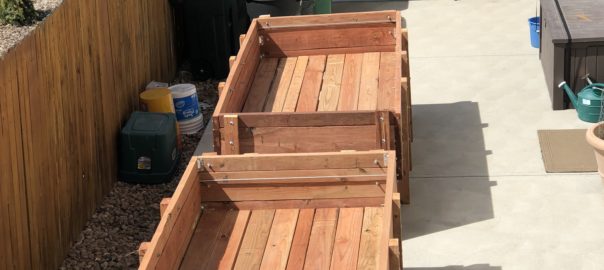The Answer is Yes! But!
It is a mistaken belief that raised vegetable gardens made from pressure treated wood will leach dangerous compounds like chromated copper arsenate into the vegetables. However, the EPA banned the use of these chemicals in December 2003 for all uses in residential applications.
The EPA was concerned that these chemicals would contaminate soil and plants around homes. Today, manufactures use several other compounds to treat wood that are considered safe for planter boxes and gardens.
The most common compounds currently used today to prevent decay from insects and fungus are alkaline copper quat (ACQ) and copper azole (CA-B). Neither of these contain arsenic and they are considered safe by the EPA.
So, yes you can use pressure treated wood for vegetable gardens.
But:
But there is still the possibility that copper may leach into our soil. Therefor, pressure treated wood cannot be used in garden beds that grow food certified as organic.
Of course, one of the main reasons we grow our own vegetables is we want them to be fresh. We don’t want them exposed to manmade chemicals like the insecticides and growth hormones we get from the vegetables in the grocery store.
Why Then, Did I Use Pressure Treated Wood for These Raised Vegetable Gardens?
First, Organic Certification:
The vegetables that grown in these beds do not need to be certified as organic. So there was no need to avoid the pressure treated wood for this reason.
Next: The Cost:
I purchased this lumber from Home Depot. At the time I am writing this article the cost of cedar is $15.47 for a 4”x 8”x 8’ board. The cost of pressure treated wood is $7.57, about half the cost of cedar.
Last: Decay resistance:
Common knowledge is that cedar is decay resistant. The truth is, only heart wood is decay resistant enough to last for a long time with direct soil contact. And most of the cedar that we buy now days is not heart wood. The majority of it is sapwood, and sapwood does not have anywhere near the resistance to decay that heartwood has. Pressure treated wood, on the other hand, will likely last for many years.
The Simple Solution:
Luckily, there is a simple solution if you want a raised garden that will last for years without the possibility of chemicals leaching into your soil: Line the pressure treated garden bed with a heavy plastic liner and put some holes in the bottom to allow the water to drain. Then you will have the best of both worlds; a lower cost and much stronger box that won’t leach chemicals into the food.



Hi Dennis, thanks for sharing this blog post. Great content and detailed pictures of the final product. It was very interesting to read about the raised vegetable garden and how using pressure treated wood is not only cheaper but likely to last years longer than the average cedar! Great point to raise that the cedar being purchased is no longer heart wood.